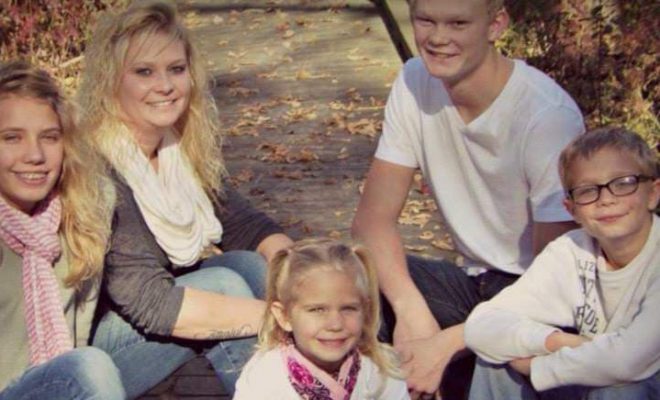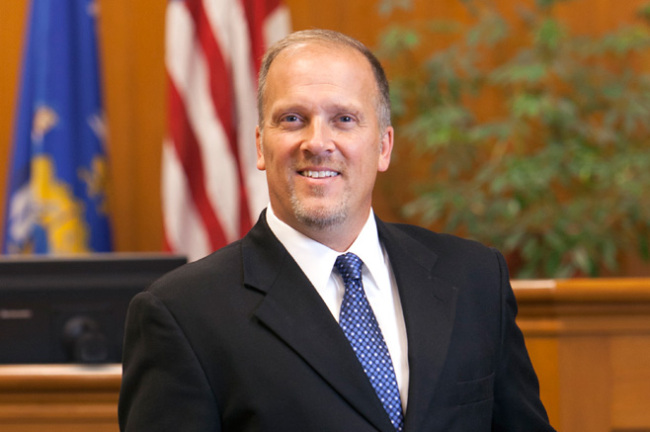Jill’s gift: The intersection of two lives

By Kris Leonhardt
CENTRAL WISCONSIN – A gift from a central Wisconsin woman has forever bonded the lives of her family with those of a Fayetteville, WV, woman.
Jill Ellis
Jill Ellis grew up in central Wisconsin. A tough, spunky girl, she struggled through the challenges life gave her, before coming into two roles that would give her a greater purpose in life.
As a mother of four, she began a career with Ripple Behavior Solutions of Marshfield in December 2014 and quickly stepped into the role of regional office manager. She was dedicated to her clients and worked hard to assist them with their needs.
While getting ready for work one day in September 2019, Ellis told her family that she was experiencing a severe headache and passed out.
Her family worked to do CPR until the ambulance came, and Jill’s family made the phone call to her mother, Teresa Karl.
“You could say that it is a parent’s worst nightmare, I guess,” she said. “You get a phone call from your kids at 4 a.m. saying, ‘Come to the emergency room.’
“I got up there and the doctor greeted me – the ER doctor – and he said, ‘We got her heart going.’ And, I am like ‘Oh, thank God.’ I thought she was okay. I walked in there, and I knew she was gone.
“She was on ventilators. She had a massive hemorrhage. She was brain dead, but she was still breathing over ventilators. They pronounced her dead at 11:57 a.m.
“They took us all in a room, and they talked to us about donating and that she was a donor. They asked if we still wanted to grant that wish. We said, ‘We can’t say no to that. She checked that box.’ Yes, we wanted to grant that wish.
They took her kidneys, liver, lungs, and heart.
“She saved five people,” Karl said.
Jennifer Skaggs
Jennifer Skaggs was born with situs inversus, a condition in which internal organs are arranged in a mirror image of a typical anatomy.
“So, all of my organs are backwards. My heart is on the opposite side, my liver is on the opposite side, everything; I am a mirror image of the normal human person,” Skaggs explained.
Skaggs added that most people that have situs inversus have primary ciliary dyskinesia.
Primary ciliary dyskinesia (PCD) is a disorder distinguished by chronic respiratory tract infections and abnormal positioning of internal organs.
“What it is that I have (is) no cilia or inactive cilia in my body, which is those tiny little hairs that remove toxins from the body. So, it is throughout your entire body and the most affected area, however, are the lungs. So, when you breathe in such things or get bacteria inside your lungs; whereas, the lung would normally be able to remove that by coughing up the bacteria. I cannot do that,” she explained.
“I also have a lot of gastric problems, for it to be able to move the food. It also affects the ability to have children, because your fallopian tubes do not move the eggs.”
Medical intervention could assist with having children, but Skaggs said that doctors do not recommend it due to the amount of medication that patients are on.
“It is throughout your entire body. It amazes you at the amount of areas that it does affect; but, for the most part people will actually live if it didn’t affect the lungs, because it is the only area that is affected to the outside, with so much toxins breathing in,” she said.
After years of struggling with respiratory and ears, nose, and throat issues, Skaggs was sent to an ears-nose-throat specialist.
In the eighth grade, Skaggs was diagnosed with PCD and began seeing a pulmonologist.
At the age of 17, Skaggs moved from a pediatric pulmonologist to an adult doctor, who studied the disorder to learn more about it for Jennifer and her sister, who was also diagnosed.
“I had gone into hospitalizations for pneumonia at least three times a year. At that point he informed us that this disease was progressive. We knew that much,” she recalled.
Skaggs had completed her senior thesis on her disease.
“It’s such a rare disease that doctors didn’t know much about it,” she added.
“There are not really any specialists in the country that just focus on our disease, simply because the funding really isn’t there because it is so rare.”
Skaggs said that when she started searching for a doctor to perform the transplant she only found six options throughout the country.
Skaggs said that she was reluctant to have a conversation about the transplant with her doctor.
“He was pushing me to have it about a year before I even agreed to go to Cleveland Clinic and start the process. I kept on holding off as long as I could. The thought of it scared me – that I was accepting the end,” Skaggs explained.
Then it came to the point where Skaggs said that her quality of life had gone down so much, that doctors were predicting she had a year left.
That was when she decided to start the conversation.
“It was going to be much better either way. I guess my fear was that if I died on the operating table. I was still going to end up being better off,” she explained.
The call
At the age of 35, Jennifer was placed on the list for a lung donor.
“I was not on the list very long, thankfully. I got put on the list in June, and I got my phone call on Sept. 14,” Jennifer recalled.
Skaggs said she had just gotten out of the hospital and wasn’t expecting a call so soon.
“I just froze. I didn’t even know what to think,” Skaggs recalled.
“After we hung up, I just kind of started crying, because I had this sadness inside of me at first. I just knew at that very moment that somebody had lost their daughter. I knew it was a girl, and I knew that she was 36 years old. So, she was the same age that I was. I had just turned 36.”
The gift
The next 24 hours were an emotional rollercoaster for Skaggs. The following day, Skaggs had surgery, which she said “went excellent.”
When she woke up, Skaggs was eager to take her first breathe.
“I kept asking the nurse for a paper and pen to write,” she said.
On the paper, Skaggs wrote “Tube out. I want to walk.”
When the tube was finally removed, the staff let her sit up, and she was talking before her family was able to return to the hospital.
“I just started breathing and talking,” she said.
“My lungs were excellent. I literally came out of there with no oxygen. I had a 98-100 percent oxygen rate, which I had not had in seven years.”
From there, Jennifer had a few setbacks, but Skaggs has been in no rejection since January of this year.
Now, Skaggs will be on about 30 post-transplant medications for the remainder of her life.
“That’s nothing compared to the life that I lived before,” she said
“I am able to hike, and I have never been able to do that…”
Becoming family
When the year anniversary of her donor’s death came around, Skaggs reached out to Jill Ellis’ family.
“I asked all of the people in my circle – family and friends – to write a letter to them to help their year mark (be) better, by telling them how thankful they are that Jill became an organ donor. To help them grieve,” Skaggs recalled.
The two families then connected on Facebook.
On a Sunday in October, the families met via Zoom and connected in a more meaningful way.
“It was so heartwarming. I was overjoyed. I miss Jill dearly and nobody can ever replace her. I had felt that why is her life more important, but when I saw her and talked to her I didn’t feel that,” said Karl.
“It’s like I not just have Jill with me, I am now a part of another family. It’s been amazing. They are amazing people. I couldn’t have gotten a better donor, because I got a whole family with this,” Skaggs said.
For more information on organ donation, visit www.donatelife.net or www.facebook.com/CentralWiGiftofLife.






